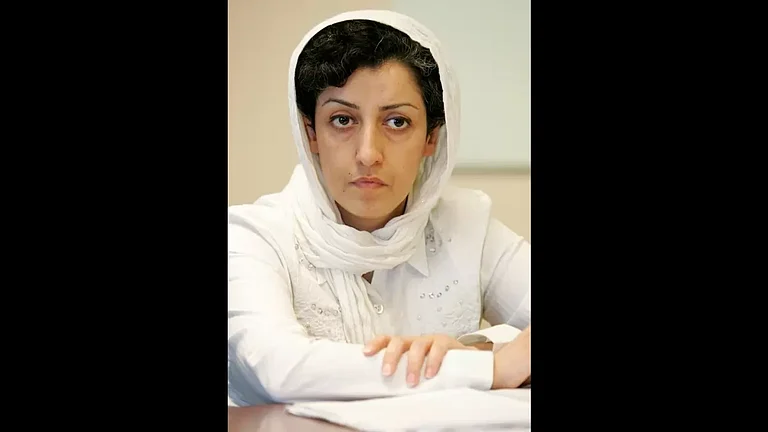HALF a century after Independence and nearly four decades since India took its first tentative steps towards setting up a national television network, Mandi House, which houses Doordarshan's directorate-general, is yet to break free from the past. Completely divorced from the reality of the post-satellite TV scenario, hopelessly out of sync with the rapidly changing times, and still constantly in need of directions from the myopic political establishment, it gets nothing right. Be it the coverage of the Independence Cup cricket series—that was an exasperatingly shoddy job, to say the very least—or the celebrations to mark 50 years of free India, which have so far been perfunctory at the very best.
The reason is not far to seek. As the rest of India celebrates independence, the breeze of freedom is yet to waft into the narrow corridors of Mandi House and blow away the thick cobwebs that have settled there—and on the minds of the bureaucrats who run the show. The government is about to deliver on its promise of full autonomy for the electronic media—the magic date: September 15, 1997. But will the move make a substantial difference?
The hamstrung, hidebound honchos who preside over The Never-Ending Doordarshan Drift—faceless men and women who have been mere puppets on Shastri Bhavan's tightly-held strings for as long as one can remember—have only a nodding acquaintance with the concept of independence. Can they handle it? Clearly, they can't. That's the reason why India's national broadcaster, despite the resources at its disposal, has failed to put together a credible, meaningful package of celebratory programmes on the occasion of the half-centenary of Independence. Indeed, it's too much to expect a government-controlled network that has never tasted freedom to celebrate the spirit of freedom in a manner that doesn't reek of either mechanical ritualism or mindless tokenism.
As a consequence, the epicentre of the electronic media's celebration of 50 years of India's Independence has been appropriated by the private satellite TV channels, both Indian and foreign. While the likes of Sony Entertainment Television and Zee TV have strung together a few oft-repeated 'patriotic' films, and little else, for the occasion, the staid BBC World and the gung-ho CNN have stepped into the yawning breach left by Doordarshan and unveiled what seems like an impressive line-up of special shows, newscasts and films to commemorate 50 years of free India. But scratch the surface of their efforts and the drawbacks of their approach to the momentous event show up in sharp relief. The two global news channels' attempts to grasp the meaning of freedom in this country have generally come unstuck primarily because they have laboured under the mistaken notion that strictly western yardsticks can be applied to judge India's growth, or the perceived lack of it. On the evening of August 14, for instance, BBC, backed by the impromptu utterances of unsuspecting interviewees, went to the extent of suggesting that India might have been better off under British rule.
Which is why Doordarshan needed to get its act together and attempt an indepth, analytical, balanced appraisal of the 'idea' of India as a nation-state in the light of 50 years of Independence. But it's hardly surprising it has made a hash of things. Its reflexes severely blunted and its imagination completely killed by years of servitude to its political bosses, Doordarshan continues to grope in the dark. Barring the de rigueur live telecast of official events—the March of the Nation on Rajpath, the special midnight session of Parliament on August 14-15, the mandatory early morning rituals at Rajghat and the Prime Minister's traditional address to the nation from the Red Fort—all that the national broadcaster has been able to rustle up on its own are stray compilations of memorable moments of the freedom struggle. Little imagination, even less profesionalism.
In sharp contrast, the foreign satellite TV channels, professional outfits now being sought to be controlled under the provisions of the upcoming Broadcast Bill, have left absolutely nothing to chance. BBC World secured special permission from the authorities for uplinking well in advance, flew in a team of correspondents andtechnicians, and have since gone about capturing the mood of the nation in the minut-est detail. Star Plus, helmed by former Door-darshan officials, hasn't been far behind, covering the midnight session of Parliament live, besides airing specially commissioned programmes commemorating 50 years of free India. Much-maligned MTV redesigned its logo in the colours of the Indian national flag, as did Channel [V]. And what did our very own Doordarshan do? Virtually nothing. With blinkers on its eyes, chains on it feet and its right hand unaware of what the left was up to, the network plods on, waiting for the delivery of all the telefilms and serials it has commissioned for the occasion. On the face of it, Doordarshan lacks nothing. It has 800 transmitters all around the country. Combined with AIR's facilities, the total value of its assets is Rs 55,000 crore. Its annual revenue is over Rs 400 crore. Its reach extends to 85 per cent of the country's area and 52 million households, making it the world's largest terrestrial television network. Add to that all the priceless archival material it has access to and we have an organisation that should have left the competition way behind. That hasn't happened simply because Doordarshan lacks that one little input that no modern broadcaster can do without—functional autonomy.
All its ills stem from the fact that Doordarshan is never ever more than a phone call away from political interference. Every time quick thinking and even quicker action is needed, it freezes in its tracks. The information and broadcasting minister and, worse still, ruling party members step in to make capital. When Rajiv Gandhi enjoyed an unassailable majority in the Lok Sabha, he turned Doordarshan into his personal broadcast station. When Ajit Panja was I&B minister, it hit rock-bottom. Doordarshan hasn't recovered since, barring a three-year period when director-general Rathikant Basu tried gamely to refurbish its image.
There's a whole year to go for the 50th anniversary celebrations to end and Doordarshan can still make amends. Provided it learns to respect its audience and master the art of professional broadcasting. That will also depend on the efficacy of the Prasar Bharati Act, due to come into effect within a month. Until then, like it or not, we'll have to continue to see India through the BBC's tinctured eyes.


























